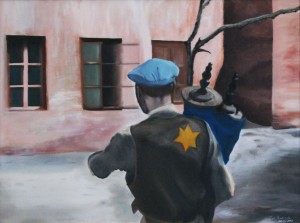During the time they remained in the ghettos, the Jews frequently engaged in so-called “illegal” activities, such as smuggling of food, medicines, etc. They also tried to preserve their Jewish identity by observing religious ceremonies and by reading the Torah in meetings held by juvenile movements. Although the Germans gave little importance to these gatherings, they immediately arrested or killed their leaders and participants.
The Nazis destroyed all Jewish religious objects they could find, such as the Torah and prayer shawls. The Jews did what they could to hide those objects from the Nazis, as a way of resistance against the domination they were subject to.
In the Lodz ghetto, however, due to the leadership of Rumkowski, the Jews had some autonomy, including freedom of religious service. For some time, they could hold religious ceremonies for the reading of the Torah. Many of the youth in the Lodz ghetto tried to continue their studies participating in classes organized by the adults, who gave them in secrecy. The students learned to hide their books under their clothes so that they were not taken by the Nazis.
